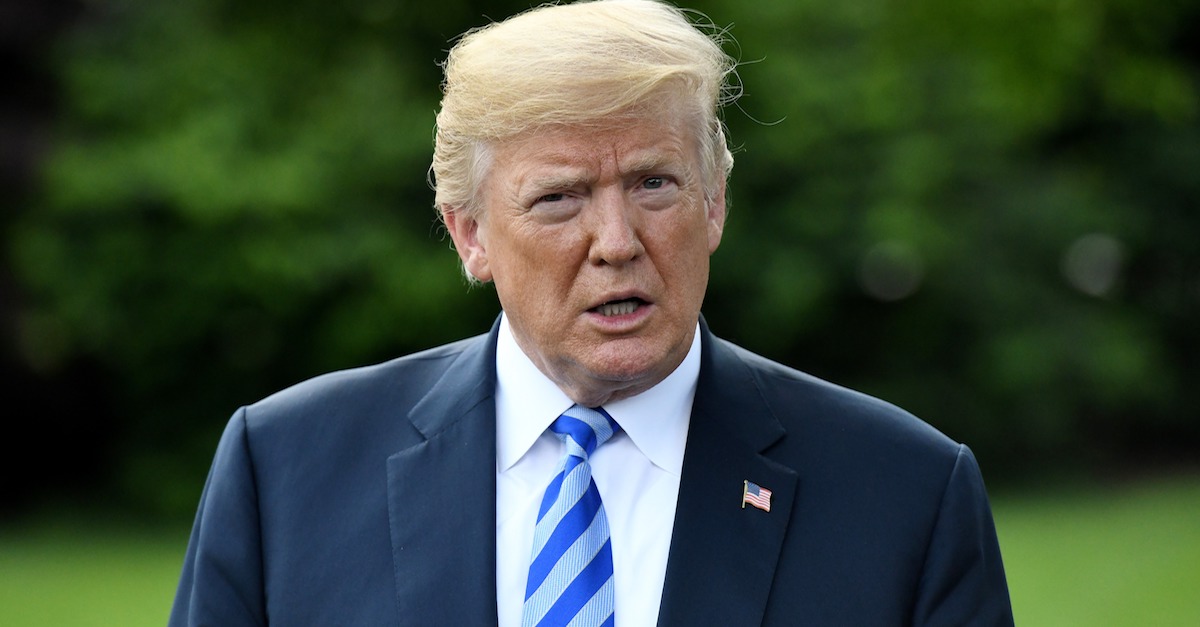
No one would really blame President Donald Trump for withdrawing Brett Kavanaugh’s nomination after Thursday’s farcical tantrum. Our swing-seat replacement came off like an apoplectic frat boy demanding the expulsion of the TA who’d kicked him out of class for cheating. Never mind the absurdness of The Kavanaugh Family Calendar or the judge’s apparent audition to be Coors Light spokesman, Kavanaugh’s attempt to stay strong during questioning had the unmistakable timbre of an easily-taunted weakling who just isn’t very good in a fight. And even if you think Christine Blasey Ford is really Hillary Clinton in a latex mask, you know Kavanaugh’s performance couldn’t have made Trump too proud.
So why is Trump choosing to stand by Kavanaugh when he has made a habit of abandoning anyone else who reflects poorly on him? Spoiler alert: it’s not because of Kavanaugh’s sober judicial judgment or his punchy writing style. It’s most likely because Kavanaugh believes presidents should be absolutely immune from all phases of criminal prosecution. And there’s an excellent chance that the issue of immunity will come before the Supreme Court during Trump’s tenure as president.
Credible or not, likely to result in conviction or not, Robert Mueller’s investigation could very well culminate in an indictment against President Trump. True, as my Law & Crime colleague Ronn Blitzer pointed out, there has long been a DOJ policy against any criminal prosecution of a sitting president — the conventional wisdom being that the right procedure would be impeachment followed by post-office prosecution.
Pragmatism certainly does weigh in favor of that traditional view; if impeachment presents a painful ordeal for the country, prosecution threatens to do so exponentially. But what is legal is not always what is most practical, and like so many things in the pre-Trump age, immunity was often assumed, and therefore, barely analyzed. If and when it comes up with respect to a prosecution of Trump for obstruction, however, immunity will be analyzed, and that analysis would quickly end up before SCOTUS.
At that time, law clerks for the high court will research the Watergate scandal, and find that although presidential immunity was fully briefed and argued before the Supreme Court, it was never actually ruled upon. During U.S. v. Nixon, James D. St. Clair (Richard Nixon’s counsel) advanced two primary arguments for presidential immunity: 1) as the head of the executive branch, executive power vests in the president alone, and on that basis, he could never be subject to prosecution; and 2) the Constitution specifies that an impeached official is subject to prosecution after removal from office, so therefore, the framers must have meant that those officials couldn’t be prosecuted before they were removed from office.
While both are certainly reasonable arguments, they’re still just arguments The president might be the chief executive, but that’s not necessarily grounds for placing him above the law, even if it would be wildly inconvenient to fend off criminal prosecution while attending to other duties. Trump himself has bragged that he could continue running his businesses in tandem with running the country. Arguments that the president is too important to deal with prosecutions might have looked good in 1978, but Trump’s arrogant above-the-law persona isn’t likely to inspire SCOTUS to maintain that view.
On the impeachment-first, prosecution-next argument – which a Justice Kavanaugh appears poised to accept, I’m going to go with what Leon Jaworski (who represented the government in Nixon’s case) said in his brief. The reference to post-term prosecution was simply the framers’ way of ensuring that an impeached official could not raise a double-jeopardy objection to a subsequent prosecution. Jaworski also noted that the clause in the Constitution applied to all officials who are subject to impeachment, not just to the President. To me, that makes the interpretation pretty obvious. Officials other than the president can certainly be prosecuted; therefore, it’s not really logical to conclude that the clause prohibited prosecutions of the president or anyone else.
As you can see, the extent of Mueller’s capacity to nail Trump’s ass to a wall likely depends on the philosophies of nine black-robed individuals. So it’s hardly surprising that given the chance, Trump will back an immunity-phile by any means necessary.
Kavanaugh, who worked as part of Kenneth Starr’s staff in the ’90s to investigate Bill Clinton, has written about his now-evolved stance on presidential immunity:
This is not something I necessarily thought in the 1980s or 1990s. Like many Americans at that time, I believed that the President should be required to shoulder the same obligations that we all carry. But in retrospect, that seems a mistake.
Kavanaugh also wrote the following, which seems to have aged particularly poorly in light of Thursday’s hearing:
[T]he nation certainly would have been better off if President Clinton could have focused on Osama bin Laden without being distracted by the Paula Jones sexual harassment case and its criminal investigation offshoots.
While we’re all still reeling from the hearing, let’s take a minute to remember what Kavanaugh-mania is really about. It’s not about false accusations, the FBI, or even about sexual assault. Republicans know that drunken sexual assaults take place every day. They know that there is almost never corroborating evidence for such assaults, and that most go unreported. And of course, eloquent statements aside, Democrats know that even the most intense investigation isn’t likely to yield solid evidence about what happened to Christine Blasey Ford in 1982. Thursday’s hysteria was all about immunity — those who want it, those who have had it, and those who will do everything they can to keep it.
[Image via Olivier Douliery-Pool/Getty Images]
This is an opinion piece. The views expressed in this article are those of just the author.